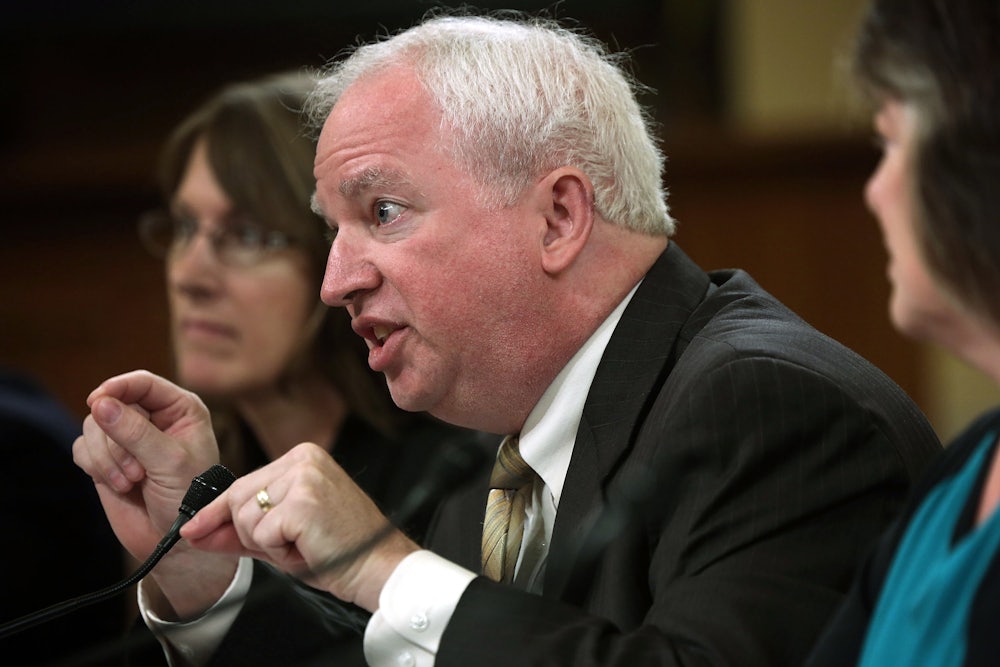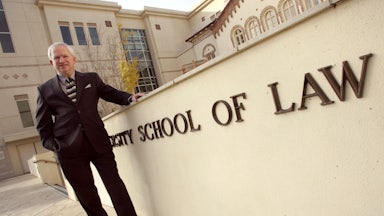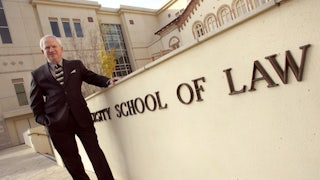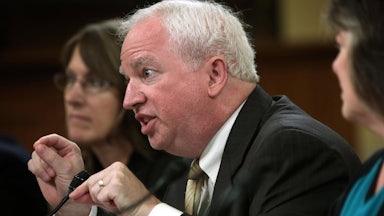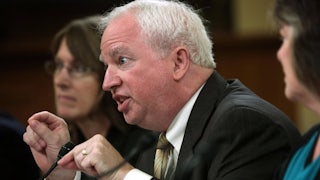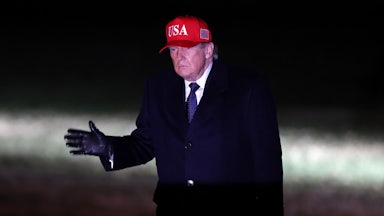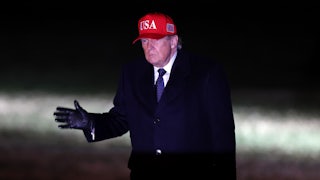Donald Trump takes everything from his lawyers but legal advice. Many who have agreed to serve as his attorneys have ended up humiliated in the eyes of their peers; disgraced in the eyes of the public; ousted by colleagues at law firms, law schools, and legal groups; and even jailed for orchestrating crimes on his behalf. A few of them might not even be lawyers for much longer.
The California state bar announced on Thursday that it would begin disbarment proceedings against conservative lawyer John Eastman, who helped mastermind Trump’s attempt to stay in power after losing the 2020 election. Disbarment would make him ineligible to practice law in California and could imperil his ability to practice it elsewhere in the country.
George Cardona, the bar’s chief trial counsel, alleged that Eastman’s false public statements about the 2020 election amount to “moral turpitude, dishonesty, and corruption” in violation of the state’s professions code. “There is nothing more sacrosanct to our American democracy than free and fair elections and the peaceful transfer of power,” Cardona said in a statement. “For California attorneys, adherence to the U.S. and California Constitutions is their highest legal duty.”
The bar’s 38-page filing makes two central accusations against Eastman. One is that he developed his legal theories and gave legal advice based on “allegations of election fraud that he knew, or was grossly negligent in not knowing, were false.” The other is that his theory that then–Vice President Mike Pence could unilaterally decide the outcome of the presidential election on January 6, 2021, was so obviously wrong as a matter of history and law that “no reasonable attorney with expertise in constitutional or election law would have concluded that the Vice President was legally authorized to take the actions respondent proposed.”
Eastman, writing on his Substack newsletter on Thursday, described the charges as a “travesty of justice” and vowed to fight them. He blamed the charges on States United Democracy Center, a political group that had filed a complaint with the California state bar in October 2021. “Unmoved by that massive amount of evidence, and apparently under intense political pressure to take action against me,” Eastman said, citing an op-ed in The Sacramento Bee, “the California bar has nevertheless filed a massive [Notice of Disciplinary Complaint] against me today, which, like the States United Democracy Center’s complaint itself, is filled with distortions, half truths, and outright falsehoods.”
He also said that the bar had sent him a 38-page letter last year requesting any evidence or communications that would support his claims. “I provided a fairly comprehensive response of about 100 pages, and incorporating by reference thousands of additional pages in sworn affidavits, expert reports, court decisions, and scholarly articles clearly demonstrating the validity, or at least the tenability, of the claims of election illegality and fraud that I was making and the legal advice I was providing,” Eastman said. That evidence apparently failed to persuade bar investigators.
If Eastman is ultimately disbarred, it would be a sudden end to an ignominious legal career. He is not very good at reading the Constitution or the law. In 2020, well before he began plotting to overturn that year’s election, he published a widely derided op-ed in Newsweek suggesting that vice presidential candidate Kamala Harris might be ineligible for that office because she was supposedly not a U.S. citizen at birth. You do not need to be a former Clarence Thomas clerk or a former Chapman University law professor, as Eastman is, to Google “Kamala Harris birthplace” and read “Oakland, California,” thus making her a natural-born citizen.
Eastman then suggested, however, that birthright citizenship itself might not be constitutional, a theory that characterizes much of his approach to the law during the 2020 election. The answer to any legal question is whatever John Eastman wants it to be, and if someone as misinformed as, say, the Supreme Court of the United States disagrees, they are also wrong and should correct themselves accordingly. This approach led him to conclude in an infamous set of memos after Election Day in 2020 that the Twelfth Amendment allows the vice president to throw out individual states’ electoral votes at his discretion and personally declare a winner. The point here is not to be right or correct—fortunately for Eastman, because he was neither—but to give a legalistic guise to a coup attempt.
Had Eastman merely published his memos on Twitter or Substack or the comment section of a local newspaper’s weekly restaurant review, his crackpot theories would have been harmless. But he brought them to then-President Donald Trump, who made them the centerpiece of a pressure campaign against Pence to carry them out. After Pence publicly refused, a mob of Trump supporters who had been summoned to the nation’s capital at Trump’s behest marched on Capitol Hill and stormed the building. We can only speculate what they would have done if they had found Pence or any of the lawmakers in the building during the joint session, but the makeshift gallows outside Capitol Hill that day, combined with the chants of “Hang Mike Pence!” that rang through the Capitol’s halls, gave us some hints.
The most important part of the bar’s notice is intent: It’s not enough for a lawyer to be wrong or even egregiously wrong; they must “know” or be “grossly negligent in not knowing” that their legal advice is based on falsehoods. Eastman’s habit of communicating by email, which I’ve praised before, has given us some evidence to support this. In December 2020, Eastman corresponded with a GOP state lawmaker in Pennsylvania who had asked about “legislative solutions to our current national predicament.” He advised that state lawmakers could, through some mathematical formula that he pulled out of thin air, extrapolate the “untainted” votes from the actual vote total and declare that to be the actual result by legislative resolution. In essence, he said they could just make it up. The voter fraud was coming from inside the house.
And on January 6, 2021, when exchanging emails with a lawyer for Pence who had called his theories “bullshit,” Eastman responded with umbrage. “My bullshit—seriously?” he fired back. “You think you can’t adjourn the session because the [Electoral Count Act of 1887, or ECA] says no adjournment, while the compelling evidence that the election was stolen continues to build and is already overwhelming.” After acknowledging that the ECA ruled out his theory, Eastman then blamed the attack on the Capitol on Pence himself. “The ‘siege’ is because YOU and your boss did not do what was necessary to allow this to be aired in a public way so the American people can see for themselves what happened,” he concluded. The bar’s notice said that these statements, made during and shortly after the attack, amounted to “moral turpitude.”
Eastman is not the only Trump lawyer facing the end of their legal career for their role in the 2020 coup attempt. A New York court suspended Rudy Giuliani’s license to practice law in 2021 for his voter fraud claims in court, while a D.C. bar discipline committee concluded last December that he violated professional rules, setting the stage for his potential disbarment in the district sometime this year. The Texas State Bar is also weighing whether to disbar Sidney Powell, of kraken-releasing infamy, for filing frivolous lawsuits after the 2020 election with false claims of voter fraud. Courts have also levied sanctions and fines against multiple Trump-aligned lawyers for their conduct during the pivotal months between Election Day and January 6.
It’s still unclear whether Trump himself will face any direct legal consequences for his actions other than his second impeachment. If he does, he’ll need lawyers to defend himself. And if his history of legal representation is any roadmap, they might need lawyers themselves. I am deeply skeptical that algorithmic chatbots like ChatGPT can ever replace genuine legal counsel. But if they are ever accepted by courts, then Trump will have finally found his perfect lawyer: something that says whatever he wants it to say and can’t be disbarred or sued for it.
